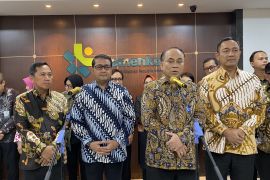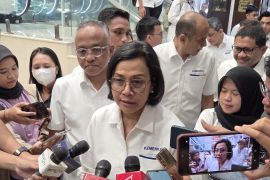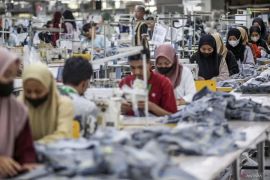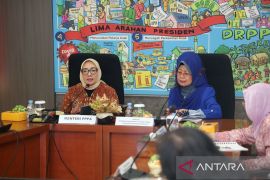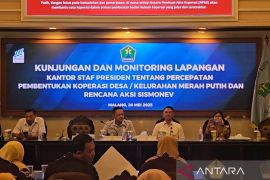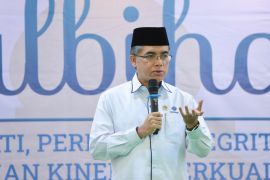According to data from Statistics Indonesia (BPS), some 25.90 million people in Indonesia lived below the poverty line as of March 2023.
The BPS noted that the poverty line in March 2023 was Rp550,458 (around US$35.25) per capita per month. Thus, 9.36 percent of the population made an existence with less than Rp550,458 per month.
Meanwhile, the inflation rate continues to fluctuate. Economic turmoil, both at the domestic and global scale, also has an impact on labor absorption, one of which is reflected in the wave of layoffs that could affect the unemployment rate.
Both the inflation and unemployment rates can affect the poverty rate, considering that inflation affects the prices of commodities while unemployment affects one’s income. The two also affect the people’s purchasing power.
To this end, interventions in the form of government policies are needed to maintain economic stability so as to maintain the people’s purchasing power and tackle the issue of poverty.
Fiscal policy intervention
One of the main interventions by the government is fiscal policy. Through the state budget, the government presented various social protection programs aimed at maintaining the community’s purchasing power.
Some examples of those programs are the Non-Cash Food Assistance (BPNT), Staple Goods Card, and Family Hope Program (PKH), under which the assistance was distributed through the Ministry of Social Affairs.
The Staple Goods Card program enabled people to meet their food needs through e-vouchers worth Rp200 thousand (around US$12.81) per month disbursed through state-owned banks.
Throughout 2023, the number of Staple Goods Card beneficiaries had reached 18.7 million, with total disbursed funding of Rp44.5 trillion (around US$2.84 billion).
Meanwhile, the PKH is conditional social assistance targeting poor families in which they can utilize health and education facilities to maintain their welfare.
In 2023, the PKH targeted 9.9 million beneficiary families, with a total budget of Rp28.1 trillion (around US$1.79 billion).
Specifically for 2023, economic turmoil was worsened by the El Nino phenomenon that was feared to disrupt food production and cause price spikes.
To address this matter, the Ministry of Finance initiated an increase in cash assistance worth Rp200 thousand (around US$12.81) that was given to 18.6 million beneficiary families in November and December.
The Ministry of Finance also increased the 10-kilogram rice assistance in December 2023.
Considering data from the National Socioeconomic Survey (Susenas) in March 2023, which stated that rice is the main commodity in the components of the poverty line, increasing rice assistance was deemed the right intervention.
To this end, the budget for rice assistance, provided to 21.3 million beneficiary families, reached Rp7.8 trillion (around US$505.37 million). The distribution of rice assistance was carried out under the authority of the National Food Agency (Bapanas).
In addition, there are several other social protection programs, such as fuel subsidy worth Rp21.3 trillion (around US$1.36 billion), electricity subsidy worth Rp68.7 trillion (around US$4.39 billion), and interest subsidy for the smallholder business credit (KUR) program worth Rp40.9 trillion (around US$2.61 billion).
The state budget also provided Rp10.4 trillion (around US$665.24 million) as village cash assistance disbursed through regional transfer spending. The funding was used to protect 2.9 million beneficiary families.
Overall, the Ministry of Finance noted that the funds disbursed from the state budget for social protection programs throughout 2023 had reached Rp443.4 trillion (around US$28.36 billion)
At least until March 2023, the inflation rate during the period from September 2022 to March 2023 was at around 1.32 percent, lower than the inflation of 3.60 percent from March 2022 to September 2022.
Meanwhile, in terms of the unemployment rate, the percentage declined, from 5.86 percent in August 2022 to 5.45 percent in February 2023.
The two presented a positive impact on the poverty rate in March 2023, which was lower than 9.57 percent, or 26.36 million people, recorded in September 2022.
Minister of Finance Sri Mulyani has repeatedly emphasized the role of the state budget as a form of the state's presence in matters of the people's welfare.
The state budget continues to be optimized to maintain the purchasing power and economic stability, so that it can become a fiscal instrument capable of protecting society, especially the poor and vulnerable groups.
Eradicating poverty
Indonesia is targeting to eradicate extreme poverty by 2045 in accordance with the 2025-2045 National Long-Term Development Plan. However, problems are still faced in the efforts to protect poor people in the country.
One of the challenges is that the assistance given has not been fully right on target. As per data from Susenas in March 2023, people from the higher-income group still became beneficiaries of the PKH and Staple Goods Card program.
So far, the distribution of social assistance has been carried out by the Ministry of Social Affairs by utilizing the integrated social welfare data (DTKS).
The government is currently making efforts to bolster the database through ways, such as by adding data information from the National Population and Family Planning Agency (BKKBN).
The Ministry of Finance recorded a decline in the effectiveness of social protection for poverty alleviation, such as PKH, whose effectiveness had declined to 3.22 percent in 2022, from 5.3 percent in 2019.
Hence, evaluations and improvements are still needed to optimize social protection for the community.
Alleviating poverty is one of the goals of the 2045 Golden Indonesia vision, under which Indonesia is targeting to increase its per capita income to US$30,300, among other things.
The future government is expected to pay attention to the indicators of people's welfare, so that the presence of the state can be felt more significantly by all levels of the community.
Related news: Ministry holds workshop to boost PENA beneficiaries’ productivity
Related news: Indonesia's all-out war against extreme poverty in 2023
Editor: Rahmad Nasution
Copyright © ANTARA 2024

